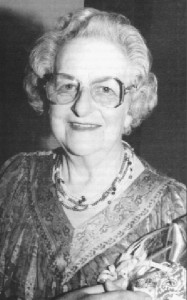Grace Hamblin, Total Churchillian

Remembering Grace: 1908-2002
Beloved by all Churchills, Grace Hamblin died at her home in Westerham, Kent, aged 94. Aware she was ailing, I had just sent her some little thing in the post; Carole Kenwright at Chartwell said it arrived in time, and she was able to read from it for a few minutes.
Grace Hamblin was the longest serving and most loyally devoted of Churchill’s inner circle, arriving at Chartwell in 1932 as an assistant to then-principal private secretary Violet Pearman. She spent virtually her entire career as private secretary, first to Winston and from 1939 to Clementine. In 1966 she became the first Administrator of Chartwell, serving through 1973. In 1974 she was secretary to the Churchill Centenary Exhibition.
She was one of the few Churchill intimates who rejected every opportunity to profit out of her long years and inside knowledge, though she was often consulted, most recently by the producers of the HBO/BBC film “The Gathering Storm.” Moreover, she loyally kept her promise “never to write,” although we were fortunate to have her as guest of honor at a 1987 Churchill Conference in Dallas, where she delivered a warm personal account of life at Chartwell. (Available by email.)
She did record her private memories for the historical record, and using these a recent book divulged that she and her brother had been the actual agents who burned a portrait Sir Winston had detested, at the behest of Lady Churchill. I knew her well enough to think she would be appalled at the media kerfuffle over this “revelation,” well known to many for years, but hardly worthy of publicity.
Grace was kind and obliging to everyone she met, but there were two kinds of people up with which she would not put: those who questioned or belittled the boss, and slapdash admirers of him who were careless with their facts.
To serious searchers for the truth, she was an inspiration to “get it right.” She was a privilege to know, one of the few alive whose experience dated to the so-called “Wilderness Years” of the 1930s, when Chartwell hummed with the writing of many books and articles, and surreptitious visits by worried confidantes as Germany armed.
The messages received at the news of her passing were touching and heartfelt. I could not however help thinking that it was time for her to go: a time when duty, honor and country seem so often to be replaced by irresponsibility, dishonor and nihilism, sacrifice by greed, unity by politics, righteous wrath by pleas for accommodation. Grace Hamblin was alive and sentient and at the center in 1940, the year Churchill said “nothing surpasses”; she could scarcely have understood the world we live in now.
In the first of his 1935 “Chartwell Bulletins,” sent to his absent wife on 1 January 1935, Churchill recalled in another context Milton’s description of the seraph Abdiel in Paradise. The words apply so perfectly to Grace Hamblin:
“Among innumerable false, unmoved;
Unshaken, unseduced, unterrified;
Her loyalty she kept, her love, her zeal.”






